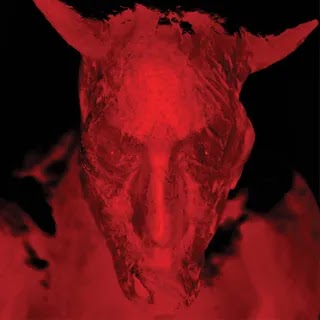Based upon early 1900s German poetry about sick patients and maimed soldiers, these two side-long tracks of experimental vocalizations highlight the singer’s conceptual, confrontational heft.
Diamanda Galás composes violently compassionate music about suffering. Her late-1980s Masque of the Red Death Trilogy focuses on AIDS, which killed her brother, Philip-Dimitri, in 1986, while other projects delve into the oppressive Greek Junta and the Armenian, Assyrian, and Anatolian Genocides. The 67-year-old goth icon performs less harrowing stuff, too—a hard-grooving 1994 collaboration with Led Zeppelin bassist John Paul Jones, a bevy of brilliant takes on blues standards. Yet at her best, Galás sharpens her cutting sense of empathy, slices open difficult subject matter, and approaches it from inside: Her 1991 dirge for HIV’s most deadly era, Plague Mass, might be the heaviest live record ever made. Ultimately, Galás’ haunted ritual, like all of her releases, is a ceremony of tenderness.
A master of the early 19th century style of bel canto singing, Galás uses her operatic genius to explore tropes uncommon in experimental composition—especially the breakdown of tortured, diseased bodies. Shaped from spectral piano and electronics, her soundscapes batter, unsettle, rouse us. Her virtuosic voice, inspired by avant-garde saxophonists Albert Ayler and Ornette Coleman, spans an untold number of octaves. She screeches, wails, bleats, and slips between characters, usually vengeful, demonic figures skulking around like a bad conscience. Both performance artist and diva, Galás has a potent theatrical sense and a persona at once progressive and full of fire and brimstone. Echoing obsolete medical drawings that illustrate sickness as floating miasma or bodily humors to be drained, she rebukes ignorant societies while harnessing their wild imaginations.
Her latest record, Broken Gargoyles, highlights the chronic nature of our callousness toward the ill and injured. Inspired by the mistreatment of wounded World War I infantrymen, Galás unearths devastating source texts from a slightly earlier era: the verse of Georg Heym (1887-1912), son of an assistant in a yellow-fever clinic and an enfant terrible of German expressionist poetry. Before his death at 24, Heym wrote unflinchingly about sick patients, maimed soldiers, and other doomed souls he might have been exposed to through his father’s work. Setting four of Heym’s poems to pulsing, droning accompaniment, Galás traces a throughline of ostracized invalids across the past century-plus of public health catastrophes. Appropriately, she premiered some of this material at a medieval German leper sanctuary and began cobbling the album together during COVID lockdown. Broken Gargoyles targets governments’ botched coronavirus responses—implicitly, it sets sights on their homophobic sluggishness to protect gay men from monkeypox, too.
The album may not shock the singer’s die-hard fans, but Broken Gargoyles is a moving, painful listen and an ideal access point for the uninitiated. Split into two tracks, each of which hovers around 20 minutes, the record occupies recognizable terrain Galás charted out on her recently reissued early career peaks, 1982’s The Litanies of Satan and 1984’s Diamanda Galás. We’ve even heard facets of this material before: In 2020, Galás released De-formation: Piano Variations, an instrumental setting for one of Heym’s poems and a collaboration with sound designer Daniel Neumann, who returns on Broken Gargoyles.
The duo’s overhaul from solo piano to full arrangement, though, is thorough. Over the skeleton of De-Formation’s chords, the opening “Mutilatus” hangs ominous synths, eerie, wordless arias, and renditions of two poems. The composition is lush and undulating, full of voices that bedevil the edges of the audio field. There’s a palpable tension between sustained keys and Galás’ precisely articulated, staccato recitations. And while her piano is largely dissonant, when she allows herself a few snatches of somber, left-handed melody, the mood turns immediately from agonized to elegiac.
Throughout, Galás draws a singular timbre from Heym’s guttural German, approaching the language itself as an instrument. Still acrobatic and versatile, her voice sounds occasionally treated, bubbling from beneath a pool’s surface. Galás’ varied intonations circle each other, crying out from mutual isolation like ailing bodies on a long, crowded ward. Thin whimpers emanate from somewhere far off; a gurgle of filtered noise fills out the low end; repetitive chimes mock us with memories of human comforts, like a food cart wheeling down a hospital hallway. On the second song, “Abiectio,” Galás’ voice warbles between consonance and caterwaul, as strings swell from melancholic tunefulness into abject anxiety. Over muffled moans, Galás’ readings grow increasingly desperate: Somehow, the track manages to be even more mortifying than its predecessor, a coda from beyond the grave.
While she’ll always be admired for her remarkable singing ability, Broken Gargoyles draws our attention to Galás’ conceptual, confrontational heft—a quality we haven’t heard from her on record since 2003’s double-disc Defixiones: Will and Testament. Her mixture of literary intelligence and three-dimensional sound design feels particularly relevant today, a direct predecessor to the talky strain of noise music that links Lucy Liyou, Lingua Ignota, even claire rousay and more eaze. Yet Broken Gargoyles pushes this side of Galás’ practice to such an extreme that she still seems a world apart from other musicians, while leaving us unable to ignore the urgency of her themes. There’s a good reason that the voices on Broken Gargoyles feel so maddeningly real: Their hurt might be bygone, but sinews of experience tie it to the present. Galás shows us humankind as both culprit and victim, a self-destructive pawn that each year grows guiltier, sadder, and more overwhelmed by the weight of bottomless trauma.



0 comments:
Post a Comment